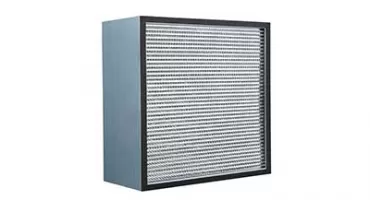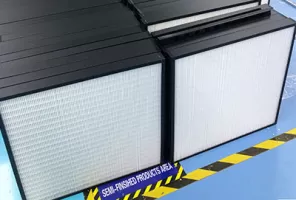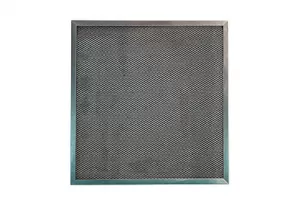 October 11, 2024
October 11, 2024
Air quality is more important than ever, especially in environments like hospitals, laboratories, and manufacturing cleanrooms, where contamination control is critical. Terminal HEPA filters (High-Efficiency Particulate Air filters) play a vital role in ensuring these spaces remain contaminant-free by providing an efficient barrier against harmful particles. In this blog, we'll dive deep into what terminal HEPA filters are, how they work, and why they're crucial for environments that require superior air filtration.
A terminal HEPA filter is a high-efficiency particulate air filter, designed to capture at least 99.97% of airborne particles as small as 0.3 microns. These filters are typically installed at the end of an air filtration system (hence terminal) to provide the final barrier to contaminants before air is released into a cleanroom or controlled environment.
HEPA filters are used in various applications, such as cleanrooms, hospitals, laboratories, and in HVAC (Heating, Ventilation, and Air Conditioning) systems to ensure that the air is free from particles that can harm sensitive equipment, procedures, or health. They are particularly effective in removing airborne particles like dust, mold, bacteria, and even some viruses.
HEPA filters achieve their high efficiency by using a dense mat of fibers that trap particles through various mechanisms, including:
Interception: Particles in the airstream come into contact with fibers and stick to them.
Impaction: Larger particles are forced into the filter fibers by the air's momentum and cannot follow the airstream around them.
Diffusion: Smaller particles (like those under 0.1 microns) move erratically, increasing the chances of being caught in the filter fibers.
This multi-layered filtration process ensures that even ultra-small contaminants are captured, making HEPA filters incredibly efficient at improving air quality in clean environments.
In environments like cleanrooms, air quality control is critical. Whether it's a pharmaceutical company manufacturing drugs or an electronic company producing microchips, the presence of even the tiniest contaminants can disrupt production or cause costly failures. Terminal HEPA filters are essential in preventing this by providing airborne particle removal at the final stage of an air filtration system.
In hospitals and laboratories, where infections and harmful microorganisms are a constant concern, medical-grade HEPA filters are often used to ensure the air is free of bacteria, viruses, and other pathogens. This makes terminal HEPA filters vital for infection control and patient safety in operating rooms, isolation wards, and sterile environments.
In an HVAC system, a terminal HEPA filter is usually installed near the air output vent, where it ensures that the final air entering the room is contaminant-free. HEPA filters for HVAC systems are designed to work with the system’s overall architecture, ensuring that the air entering a cleanroom or critical environment meets stringent cleanliness standards.
Terminal filters are often used in cleanroom filtration systems, where they are the last line of defense before air reaches the controlled space. This final stage filtration helps maintain high cleanliness levels, which are essential for sectors like pharmaceuticals, biotechnology, aerospace, and electronics manufacturing.
There are various types of terminal filters available depending on the specific requirements of the environment. For example:
Standard HEPA filters are sufficient for many commercial and industrial settings.
Medical-grade HEPA filters are commonly used in healthcare settings to ensure a sterile atmosphere.
Ultra-low penetration air (ULPA) filters offer even higher filtration efficiency than standard HEPA filters, capturing up to 99.9995% of airborne particles.
Each filter type has specific applications, but all share the goal of ensuring clean, contaminant-free air in sensitive environments.
Air filtration efficiency is crucial for maintaining high air quality standards in sensitive environments. Terminal HEPA filters are specifically designed to optimize this. They have a high-efficiency particulate air filter rating, meaning they capture nearly all airborne particles. When incorporated into a larger air filtration system, these filters help maintain the integrity of cleanrooms and other controlled spaces by preventing harmful particles from entering.
However, the filtration efficiency of a HEPA filter can be influenced by various factors, including airflow resistance and the size of the particles being filtered.
One challenge in HEPA filter applications is airflow resistance, which can affect the overall performance of the air filtration system. When the filter is too dense, it can restrict airflow, making the HVAC system work harder to push air through the filter. This can lead to increased energy consumption and reduce the system's efficiency over time.
To mitigate this, engineers need to balance filter density and airflow in order to achieve the desired level of filtration without compromising the system’s performance. This is particularly important in settings like cleanrooms and laboratories, where contaminant filtration is non-negotiable, but energy efficiency is also a key consideration.
Regular HEPA filter maintenance is essential to ensure that the filters continue to operate at their maximum efficiency. Over time, dust and particles can clog the filter, reducing its effectiveness. Depending on the environment and the amount of particulate matter in the air, filters may need to be replaced every 6-12 months.
The lifespan of a HEPA filter also depends on how well it's maintained. Routine checks, cleaning (where applicable), and timely replacement ensure that the filter continues to provide optimal performance.
Terminal HEPA filters have a wide range of applications, including:
Cleanrooms: Used in industries such as pharmaceuticals, semiconductors, and biotechnology to prevent contamination.
Hospitals: Installed in operating rooms, ICUs, and isolation wards to maintain sterile environments.
Laboratories: Provide clean air in research facilities where even minor contamination can affect the accuracy of experiments.
Aerospace and Electronics: Used in environments where precision is key, and airborne particles can damage sensitive equipment.
In all these settings, the HEPA filter for laboratories and HEPA filter for HVAC systems play a vital role in ensuring that the air remains clean and free of contaminants.
Proper HEPA filter installation is critical to the filter’s performance. If the filter isn’t installed correctly, there may be gaps or leaks that allow particles to bypass the filter and enter the cleanroom or controlled environment. Most terminal filters are designed for easy installation, but it's important to follow the manufacturer’s guidelines closely and to ensure that the filter fits snugly into the air filtration system.
Terminal HEPA filters are indispensable in maintaining air quality in environments where cleanliness and sterility are paramount. Their ability to capture microscopic particles ensures that the air is free from contaminants, making them essential for industries ranging from healthcare to manufacturing.
By understanding air filtration efficiency, HEPA filter maintenance, and airflow resistance, facility managers can ensure that their filtration systems perform optimally, protecting sensitive environments and maintaining high air quality standards. Whether you are in need of cleanroom filtration or considering installing medical-grade HEPA filters, investing in the right terminal HEPA filter can make all the difference in air quality control.
Keeping these filters in top condition and choosing the correct type for your specific application will ensure that your terminal filtration unit performs effectively, helping you maintain a clean, contaminant-free space for years to come.
 Jun. 08, 2023
Separator HEPA Filters An Effective Solution for Air Filtration
Jun. 08, 2023
Separator HEPA Filters An Effective Solution for Air Filtration
 Dec. 12, 2024
How to Clean a HEPA Filter: A Step-by-Step Guide
Dec. 12, 2024
How to Clean a HEPA Filter: A Step-by-Step Guide
Cleaning your HEPA filter properly ensures it remains efficient and extends its lifespan.
 Jan. 09, 2025
Stainless Steel Cleanable Air Filters: A Durable and Sustainable Solution
Jan. 09, 2025
Stainless Steel Cleanable Air Filters: A Durable and Sustainable Solution

